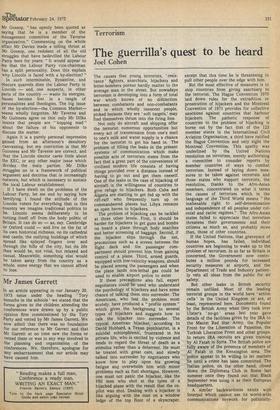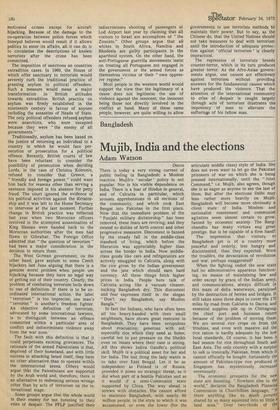Terrorism
The guerrilla's quest to be heard
Joel Cohen
The causes that young terrorists, ' resistance ' fighters, anarchists, hijackers and letter-bombers pursue hardly matter to the average man in the street. But nowadays terrorism is developing into a form of total war which knows of no distinction between combatants and non-combatants and in which wholly innocent people, picked because they are ' soft targets,' may find themselves thrust into the firing line.
Not only do aircraft and shipping offer the terrorist numerous opportunities but every act of transmission from one's mail to one's milk and water supply is a chance for the terrorist to get his hand in. The problem of filling the leaks in the present systems of communication which make possible acts of terrorism stems from the fact that a great part of the convenience of civilised modern life consists of having things provided over a distance instead of having to go out and get them oneself. One of the leaks in the case of hijacking of aircraft is the willingness of countries to give refuge to hijackers. Both Cuba and Algeria are starting to get fed up with the riff-raff who frequently turn up on commandeered planes but Libya remains an open haven to hijackers.
The problem of hijacking can be tackled at three other levels. First, it should be harder for hijackers to get guns and bombs on board a plane through body searches and better screening of baggage. Second, if the hijacker slips through the net, precautions such as a screen between the flight deck and the passenger compartment should prevent him from gaining control of a plane. Third, armed guards, equipped with low-velocity weapons, should be placed among the passengers and when the plane lands non-lethal gas could be used to enable airport police to enter
If these precautions also fail, expert negotiators could be used who understand the psychology of hijackers and have some chance of talking them into surrender. The Americans, who feel the problem most acutely, have produced a "profile system" which gives the background to several types of hijackers and suggests how to talk the hijacker into surrender. The typical American hijacker, according to David Hubbard, a Texan psychiatrist, is a suicidal schizophrenic, frustrated in his private life, who is excited by violence and tends to regard the threat of death as a stimulus rather than a deterrent. He must be treated with great care, and slowly talked into surrender by negotiators who know how to play upon his growing fatigue and overwhelm him with minor problems such as fuel shortages. However, one must not panic the hijacker, like the FBI men who shot at the tyres of a hijacked plane with the result that the copilot was shot. Dealing with a hijacker is like arguing with the man on a window ledge of the top floor of a skyscraper,
except that this time he is threatening to pull other people over the edge with him.
But the most effective of measures is to stop countries from giving sanctuary to the terrorist. The Hague Convention 1970 laid down rules for the extradition or prosecution of hijackers and the Montreal Convention of 1971 provides for collective sanctions against countries that harbour hijackers. The pathetic response of countries to the problem of hijacking is borne out by the fact that of the 123 member states in the International Civil Aviation Organisation, a third have ratified the Hague Convention and only eight the Montreal Convention. This apathy was underlined by the United Nations resolution on terrorism, merely authorising a committee to consider reports by member countries of ways to combat terrorism. Instead of laying down measures to be taken against terrorists and those states who support terrorists, the resolution, thanks to the Afro-Asian members, concentrated on what it terms the causes of terrorism which in the language of the Third World means 'the inalienable right to self-determination and independence of all peoples under colonial and racist regimes." The Afro-Asian states failed to appreciate that terrorism threatens their governments and their citizens as much as, and probably more than, those of other countries.
If the United Nations, that graveyard of human hopes, has failed, individual countries are beginning to wake up to the problem of terrorism. In so far as Britain is concerned, the Government now contributes a million pounds for increased security measures at airports, and the Department of Trade and Industry patiently vets all ideas from the public for air safety.
But other leaks in British security remain unfilled. Most of the leading terrorist groups in the world have ' action cells ' in the United Kingdom or are, at least, represented here. Documents found by the British Army when they took over Ulster's ' no-go ' areas last year gave details of the facilities given by the IRA to the Maoist Red Star Army, the Popular Front for the Liberation of Palestine, the Turkish Liberation Front and other groups. In return IRA recruits are given training by Al Fatah in Syria. The British police are fully aware of the presence of members of Al Fatah in the Kensington area. The police appear to be willing to let matters
lie until a crime has been committed. The Italian police, on the other hand, closed down the Diplomats Club in Rome last summer once they found out that Black September was using it as their European headquarters.
A similar backwardness exists with Interpol which cannot use its world-wide communications network for politically motivated crimes except for aircraft hijacking. Because of the damage to the co-operation between police forces which Interpol believes would result if it allows politics to enter its affairs, all it can do is to circularise the descriptions of known terrorists after the crime has been committed.
The imposition of sanctions on countries extradition cases. In 1969, the House of which offer sanctuary to terrorists would severely curb the traditional practice of granting asylum to political offenders. Such a measure would mean a major transformation in British attitudes towards extradition. British practice on asylum was firmly established in the nineteenth century in favour of anyone including the assassins of Heads of State. The only political offenders refused asylum were anarchists, who were excepted because they were "the enemy of all governments."
Traditionally, asylum has been based on the justice of returning an individual to a country in which he would face per secution or prosecution for a political offence. Recently, British courts of law have been reluctant to consider the possibility of persecution when deciding Lords, in the case of Christos Kotronis, refused to consider that Greece, a "friendly and foreign power," could want him back for reasons other than serving a sentence imposed in his absence for petty fraud. The court ignored the evidence of his political activities against the dictator ship and it was left to the Home Secretary to intervene at the last moment. Further change in British practice was reflected last year when two Moroccan officers involved in the attempted assassination of King Hassan were handed back to the Moroccan authorities after the men had flown to Gibraltar. The Foreign Office admitted that "the question of terrorism " had been a major consideration in the decision to return them.
The West German government, on the other hand, gave asylum to some Czech hijackers last June arguing that there is a genuine moral problem when people use hijacking because they have no legal way of getting out of their country. Clearly, the problem of combating terrorism boils down to one of definition. If there is to be co ordinated international action, the label "terrorism " is too imprecise; one man's " terrorist " is another's freedom fighter.
An objective definition of terrorism, advocated by some international lawyers, is to distinguish between an offence committed within a particular area of conflict and indiscriminate violence away from the war zone.
The fault with this definition is that it could perpetuate existing grievances. The rationale of the armed Palestinians is that, deprived of their homeland, and with little success in attacking Israel itself, they have no other alternative than to operate within the international arena. Others would argue that the Palestinians are supported by the Arab world and, therefore, there is an alternative to redressing serious wrongs other than by acts of terrorism on the international stage.
Some groups argue that the whole world is their enemy for not listening to their cries of despair. The PFLP justified their indiscriminate shooting of passengers at Lod Airport last year by claiming that all visitors to Israel are accomplices of "the Zionists." Other groups argue that all whites in South Africa, Namibia and Rhodesia are guilty participants in the apartheid .system. On the other hand, the anti-Portuguese guerrilla movements insist on treating all Portuguese not engaged in the government or the armed forces as themselves victims of their "own oppresive regime."
Most people in the western world would support the view that the legitimacy of a cause does not legitimise the use of violence against the innocent; the innocent being those not directly involved in the conflict at hand. Many of these same people, however, are quite willing to allow governments to use terrorists methods to maintain their power. But to say, as the Chinese do, that the United Nations should not take measures to deal with terrorism until the introduction of adequate protection against 'official terrorism' is clearly impractical.
The repression of terrorists breeds counter-terror, which in its turn produces greater terror. As the Afro-Asian governments argue, one cannot act effectively against terrorism without providing answers for the fundamental causes which have produced the violence. That the attention of the international community to cries of despair is caught largely through acts of terrorism illustrates the impotency of man to alleviate the sufferings of his fellow man.



































 Previous page
Previous page